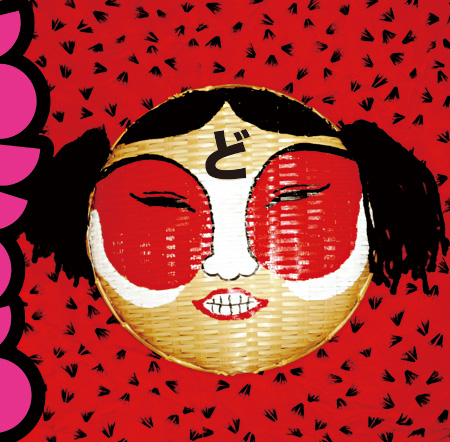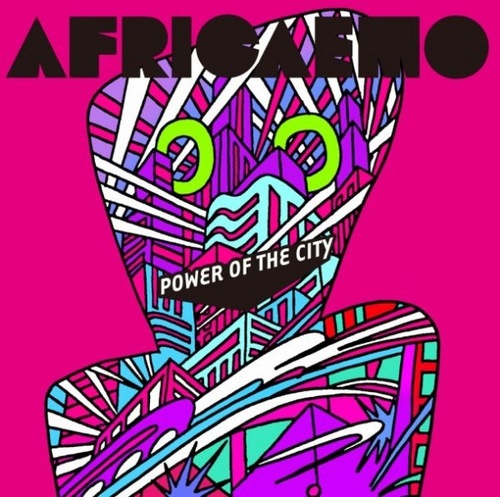Stuff We Missed Catch-Up Post #1: DODDODO, Turntable Films, Africaemo, Aloha And Girls’ Generation

Welp, it’s now September and we’ve completely failed to talk about a handful of great (and not so great!) Japanese albums. Massive, massive failure on my part, especially after I went and named uhhhhh June “Stuff We Missed Month” before not getting through anything.
Yet with the time fast approaching when nerds like me put together year-end lists, it seems like time to run through all the important Japanese releases that didn’t get a thorough write-up this year. So…welcome to part one of a series of posts offering up quick reviews of notable Japanese albums that slipped by me. These won’t be as wordy and drawn out as the regular reviews, as quick as possible actually for time’s sake. Still, I hope these can lead you to some good stuff that didn’t get the full attention they deserved (or maybe didn’t). Let’s go!
DODDODO DO
On NHK they have a kid’s show called Nihongo De Asobo. Airing once every morning and again in the afternoon, the brief program follows a giant-orange-ball of a man and various other characters as they have fun using (and secretly learning!) the Japanese language. Throughout the entire thing they play this classical Japanese music made kid friendly, full of traditional noises I’ve heard in, like, Kabuki videos we watched in Japanese history class.
DODDODO’s DO could easily soundtrack an alternate reality version of Nihongo De Asobo where everything happens inside one eccentric individual’s head, all the parts played by that very same person conjuring up the cerebral kid’s show in the first place. The Osaka artist makes songs that at times resemble children’s nursery rhymes, simplistic hop-scoth tempo colliding with her shouty voice. She peppers these songs with what I can only describe as very “Japanese” sounds, something like the noises you hear in those traditional Japanese dramas. Like her live show, which finds DODDODO going it alone with only a sampler and her wild voice, this is a defiantly solo work complete with a ballad where DODDODO croons over a lonely guitar and some kid-stuff flute.
Yet what elevates this above NHK merchandise is the dual threat of her music having an experimental edge and being incredibly catchy. Their is a song here where DODDODO might just be dropping stuff on the studio floor…yet it’s a fascinating bit of recording. Even the more kindergarten-ready-chant songs sometimes get a strange touch. Seeing as these are almost like nursery rhymes, DODDODO makes sure they could be accessible to everyone, most of the tracks here built around jaunty beats and slightly upbeat melodies. Something seems slightly subversive here…or maybe a really strange throwback to the Edo Period…but few albums in any country sound as outright interesting as this one.
Turntable Films 10 Days Plus One
Originally released in late 2010 but re-released in greater numbers by Second Royal this year, 10 Days Plus One ends up being a strange record to write about from the super-promising Kyoto quartet. They move in a slightly folkier direction here which isn’t really shocking considering last year’s great Parables Of Fe-Fum had plenty of woodsier moments, and they at worst these Dylan-esque bits still sound OK. Thing is, the absolute best parts of Turntable Film’s first album came on the tracks embracing pure pop. They channeled Brian Wilson on “Hot Tea After The Lunch” and hit on something especially special on “2Steps.”
10 Days Plus One doesn’t really have any similar highlights. There is good stuff for sure…opener “Tape Recorder” brings to mind The Beatles at their silliest, while “Awake” finds them nailing the folk thing and “A Monster” giving us a version of the band flirting with psychedelic horizons. “Collection Of You” ends up the album’s unfuckwithable masterpiece, a sad-sack gallop that is the band’s best lyrical moment to date. Lead singer Yosuke Inoue seemingly copes with a breakup by…focusing on the inevitable end of all things. The other parts of 10 Days ring more spotty – most of the other folk songs seem like stretched attempts at being Nick Drake, with diminishing returns. Worst of all, though, is the two song run late of “Lazy Sunday” and “Hawaii.” The latter is a bit of go-nowehere Tommy Bahama soundtrack, but “Lazy Sunday” sees Turntable Films put on their shit-encrusted cowboy boots to record a song aping the very worst of Wilco with 3/4s of the budget. That’s the only true skippable moment here, but as a whole 10 Days feels more above average than knockout…”Collection Of You” deserves all the love it can handle but everything else just seems “OK.”
Africaemo Power Of The City
Africaemo’s debut Squatter came out relatively close to Turntable Film’s Parables Of Fe-Fum…which is to say, 2010…and just like the above-reviewed group they had the tough task of following up a great debut with a sophomore effort in 2011. Yet whereas Turntable Films stepped out a bit with mixed results, Africaemo stick firm like Bubble Tape to the frantic noise that got eyes-a-turnin’ in the first place. Power Of The City offers up more twisting dance-rock like Squatter did and pretty much hits all the same pleasure spots. They offer up some new twists – “Yes! Today” breaks out some fat neon-grubworms of keyboards that should be on a Dam-Funk album to create a surprisingly slinky track, yet everything else is pretty much in order for Africaemo to get compared to Friendly Fires more. Power Of The City’s biggest strength, though, comes from the two tracks bookending this album. “City Boy, City Girl” has already gotten some props, while closer “Kiss You” might be the best track Tokyo Police Club failed to write.
Aloha うたのゆくえ
I’ve never been on a cruise, and thanks to David Foster Wallace I probably never will, but I imagine Aloha’s latest album captures the experience pretty well. Everything starts off peachy, excitement over swift cabin service and all the shuffleboard you want on the ship, and in the case of うたのゆくえ two great opening tracks. There’s the lazy-day twee of 恋のリズム followed up by the super-fun lounge bop of “ChinaTown.” Looking good right? Then the middle hits. On the boat, the extravagant meals become a chore and you run out of books to read and boredom sets in. Aloha embraces the organ-and-horn-heavy vibe of “ChinaTown” but does so in a way not nearly as joyous as that track, resulting in a relaxed but ultimately slogging center that is too chilled out to hate (beats work, yeah?) but something that prompts a lot of iPhone peeking. There are late highlights – the skittery “ユレルキセツ” ups the tempo and succeeds because of it, while “Tack” uses those horns in a way that feels enveloping instead of lazy. I guess it would be the equivalent of…I don’t know, Mexican night, or a pirate attack? Their are highlights definitely worth revisiting on this Aloha album, but for the most part it’s like a cruise…a brief, at times boring, escape from whatever you were doing before.
Girls’ Generation Girls’ Generation
It’s important to give any review of this album hyper-specific context before jumping in so…I’m not going to compare Girls’ Generation’s Japanese debut to anything else, no other K-to-J-pop crossover groups nor to any Japanese acts of the moment. This is miles ahead of nearly everything Japanese pop groups are pumping out, and you don’t need to hear it again. People way smarter than me have compared this to AKB48 and pretty much nailed it, so you don’t need me to reheat it. Instead, let’s consider ONLY this album.
The verdict? Pretty good, albeit no classic. This is mostly a home for Girls’ Generation’s smash-hit singles to stay in, so your opinion of those will determine your overall opinion of this release. Personally, I’m pretty so-so on “Genie,” coming around but not in love with “Mr. Taxi” or “Run Devil Run,” and blindly in love with “The Great Escape.” Oh, and “Gee,” which probably bests several alien civilizations.
How about those non-singles? Vary in quality. “You-aholic,” save for its stupid name, ends up one of the strongest tracks here, taking cues from Off The Wall and bringing them up to speed for the iPad generation. “Beautiful Stranger,” “I’m In Love With The HERO” and especially closing ballad “Born To Be A Lady,” meanwhile all seems pretty forgettable, either biting from ignorable Western acts (Pink?) or trying to copy J-Pop (never do that). But man, “Let It Rain” nails American R&B at it’s most dramatic, as the name kind of hints at, the sort of tune guaranteed to play in a Gold’s Gym locker room but also enjoyable.
So overall, on its own merits with no mention of outside forces – above-average pop record with a handful of killer singles that guaranteed that this album would sell like crazy.




